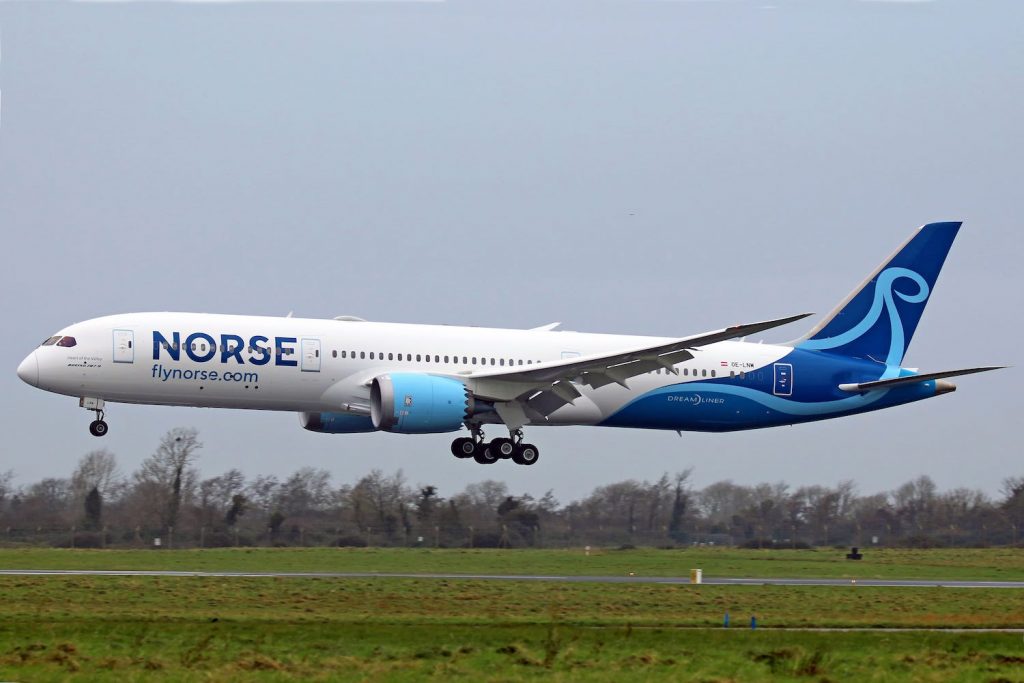- A new transatlantic airline received 3,000 applications for its first 50 pilot roles.
- This is despite a global shortage of pilots that's left airlines struggling to meet travel demand.
- The chance to fly Boeing Dreamliner jets has been a draw, a spokesperson said.
There's a global shortage of pilots and aircrew, but one company has had no trouble finding recruits.
Norse Atlantic Airways, a new Norwegian low-cost transatlantic airline received more than 3,000 applications for its first 50 pilot roles, according to the BBC, who interviewed its founder and CEO, Bjorn Tore Larsen.
Passengers continue to face travel chaos and delays as an ongoing shortage of flight crew, along with economic factors, has left airlines struggling to meet pent-up, post-lockdown travel demand.
Norse will begin flying non-stop between Oslo, and JFK, Los Angeles, Fort Lauderdale and Orlando from June. A non-stop, route between London Gatwick and New York's JFK will begin in August. It will operate Boeing 787-9 Dreamliner planes formerly operated by Norwegian Air, which saw its long-haul division collapse during the pandemic.
A Norse spokesperson told Insider that the number of applicants is higher than anticipated and all are from qualified pilots, including some that work for other airlines.
The opportunity to fly Dreamliners has been a popular draw for pilots, the spokesperson told Insider.
Larsen was one of two airline executives from the suite of new challenger carriers that have launched over the last two years in order to meet the shortfall. He'd previously put off starting an airline due to difficulties finding staff, sourcing planes and securing landing berths at airports, per BBC News.
But now sees the current market as a "golden opportunity."
"We don't have any legacy systems," he told BBC News. "We are able to start off this airline in exactly the way we would like to."
"We have the flexibility to enter the market cautiously and in line with demand, which is exactly what we will do," Larsen added.
Pent-up demand and existing shortages are forcing airlines to change how they recruit
Air passenger numbers rose 76% in the year to March 2022, according to figures from the International Air Transport Association. While still 41% below pre-pandemic 2019 levels, airlines are finding it hard to meet the uptick. If demand carries on at its current rate, US airlines will need to find 14,700 pilots by 2030 to meet it, the Bureau of Labor Statistics estimated.
The pandemic lockdowns exacerbated what was already an existing labor shortage, caused partly by an aging workforce and a squeezed pipeline of new recruits.
The consultancy Oliver Wyman estimates that the global shortfall could stretch to 35,000 pilots by 2025.
Bosses are getting creative in order to speed up recruitment of pilots, by boosting pay, reducing the required training hours, and nixing the requirement for a four-year college degree.
EasyJet, the low-budget British airline, is removing the last row of seats from some planes to enable flights to operate with one fewer member of the cabin crew.
Passengers were left in limbo over Memorial Day weekend after thousands of flights were cancelled. On Saturday, Delta canceled 250 flights — up to 9% of its operations, and a further 140 on Sunday. The airline plans to cancel up to 100 flights a day between July and August to prevent major travel disruption.
"Vendor staffing" and "higher-than-planned unscheduled absences in some work groups" were among the reasons cited by Allison Ausband, Delta's chief customer experience officer, per Fortune.

